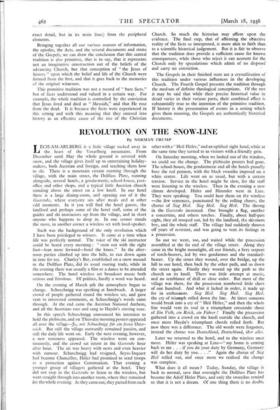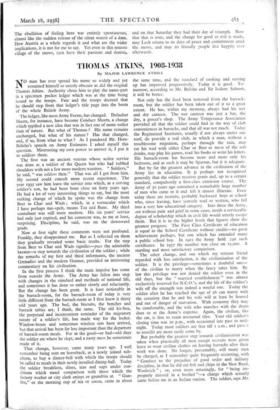REVOLUTION ON THE SNOW-LINE
By NORMAN CRUMP
LECH-AM-ARLBERG is a little village tucked away in the heart of the Vorarlberg mountains. From December until May the whole ground is covered with snow, and the village gives itself up to entertaining holiday- makers, both Austrian and foreign, and teaching them how to ski. There is a mountain stream running through the village, with the main street, the Dollfuss Plate, running alongside, several hotels,.a gendarmerie, school-house, post- office and other shops, and a typical little Austrian church standing above the street on a low knoll. In our hotel there is a large dining-room, and opening out of it the Gaststube, where everyone sits after meals and at other cdd moments. In it you will find the hotel guests, the landlord and perhaps some of the hotel staff, some of the guides and ski instructors up from the village, and in short anyone who happens to drop in. In one corner stands the stove, in another corner a wireless set with loud-speaker.
Such was the background of the only revolution which I have been privileged to witness. It came at a time when life was perfectly normal. The voice of the ski instructor could be heard every morning : " stem out with the right foot—lean more forward—bend the knees." In the after- noon parties climbed up into the hills, to run down again in time for tea. Charley's Bar, established on a snow mound in the Dollfuss Platz, did its usual roaring trade, while in the evening there was usually a film or a dance to be attended somewhere. The hotel wireless set broadcast music both serious and frivolous. Of politics, hardly a word was heard.
On the evening of March 9th the atmosphere began to change. Schuschnigg was speaking at Innsbruck. A larger crowd of people gathered round the wireless set, and gave vent to interested comments, as Schuschnigg's words came through. At the end came the Austrian National Anthem, and all the Austrians rose and sang to Haydn's stirring tune.
In this speech Schuschnigg announced his intention to hold the plebiscite, and on Thursday morning posters appeared all over the village—ja, mit Schuschnigg fur ein freies tJster- reich. But still the village outwardly remained passive, and still the daily life went on. Early the next evening, however, a new tenseness appeared. The wireless went on con- tinuously, and the crowd sat intent in the Gaststube hour after hour. The air was heavy with news and even heavier with rumour. Schuschnigg had resigned, Seyss-Inquart had become Chancellor, Hitler had promised to send troops as a protection against Communism. That evening a younger group of villagers gathered at the hotel. They did not stop in the Gaststube to listen to the wireless, but went straight through into another room, where they remained for the whole evening. As they came out, they parted from each other with a " Heil Hitler," and an uplifted right hand, while at the same time they turned to us visitors with a friendly grin.
On Saturday morning, when we looked out of the window, we could see the change. The plebiscite posters had gone. The school-house, the gendarmerie and all the hotels proudly bore the red pennon, with the black swastika imposed on a white centre. Life went on as usual, but with a certain tension. Service in the hotel might be slow, for the staff were listening to the wireless. Then in the evening a new climax developed. Hitler and Himmler were in Linz. They were speaking. You could hear them on the wireless —the few sentences, punctuated by the rolling cheers, the chorus of Sieg Heil. Sieg Heil. Sieg Heil. The throng in the Gaststube increased. One brought a flag, another a concertina, and others torches. Finally, about half-past eight, they all trooped out, led by the landlord, the ski-room boy, and the whole staff. The village had suddenly thrown off years of restraint, and was going to vent its feelings in a procession.
So out we went, too, and waited while the procession assembled at the far end of the village street. Along they came in the bright moonlight, all our friends, a fiery serpent of torch-bearers, led by two gendarmes and the standard- bearer. Up the street they wound, over the bridge, up the hill to our hotel, then back by the other path, and so down the street again. Finally they wound up the path to the church on its knoll. There was little attempt at music, and no semblance of drill or close order. But most of the village was there, for the procession numbered little short of one hundred. And what it lacked in order, it made up for in enthusiasm. Sieg Heil. Sieg Heil. Sieg the cry of triumph rolled down the line. At times someone would break into a cry of " Heil Hitler," and then the whole line would vent its soul in a triumphant crescendo shout of Ein Volk, ein Reich, ein Fiihrer ! Finally the procession gathered into a crowd on the knoll outside the church, and once more Haydn's triumphant chords rolled forth. But now there was a difference. The old words were forgotten, instead the chorus was Deutschland, Deutschland, fiber Later we returned to the hotel, and to the wireless once more. Hitler was speaking at Linz—" my home is coming back to me . . . if you do your duty by Germany, Germany will do her duty by you. . . ." Again the chorus of Sieg Heil rolled out, and once more we realised the change was complete.
What does it all mean ? Today, Sunday, the village is back to normal, save that overnight the Dollfuss Platz has become the Adolf Hitler Platz, and only the swastikas remind us that it is not a dream. Of one thing there is no doubt. The ebullition of feeling .here was entirely spontaneous; almost like the sudden release of the silent waters of a dam.; How Austria as a whole regards it and what are the. wider implications, it is not for me to say. Yet even in this remote: village of the snows, men have their passions and desiress:. and on that Saturday they had their day of triumph. Now that that is over, and the change for good or evil is made, may Lech return to its days of peace and contentment amid the, snows, and may its friendly people live happily ever afterwards.















































 Previous page
Previous page